Is Project 2025 the “Republic” they keep talking about?
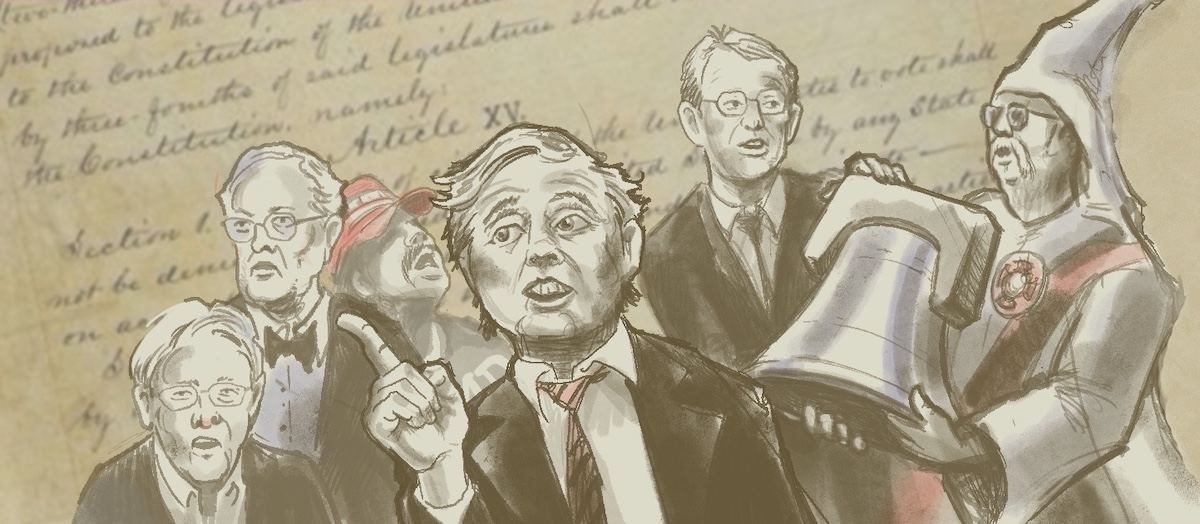
(for easier readin' on rant.li, we published this article in reverse order. and (if you’re lookin’ for Part 1, we got ya))
Considering the Heritage Foundation’s Libertarian™ and fundamentalist ultra-caucasian legacy and membership, little surprise that their new edition of Mandate for Leadership looks as sticky as a Robert Welch wet dream with all the draconian austerity and the purging of “secret Communist” woke government employees to be replaced by weaponized redpilled loyalists.
Project 2025 is like an amalgamation of the intentions built up behind the unitary executive theory (the kind their reactionary forebearers decried during FDR & Truman administrations) with a hybrid Calhoun-ish “States’ Rights,” as long as the traditionalist Evangelical led Republican-imbued federal government prepares the policies for their conservative state legislatures to pass. An amped up surveillance state with police forces to ensure women & children not leave their home-states willy nilly, deploying of military for domestic policing, directing the DOJ to pursue political adversaries, privatizing as many agencies that their financial sponsors are willing to take over, redefining & censoring language that may offend caucasoidal christendom, banning of anything deemed “pornographic” or “degenerate,” dismantling the Constitution’s separation of powers, ending of policies aimed at protecting the environment or human health, suppression of unions & unionizing efforts, and decreasing voting & civil rights all sounds like something that absurdly vainglorious people, believing that some divine force gave them and their race dominion over the entire world, would come up with. All of that while selling it by repudiating the U.S. electoral system and pointing at Joseph McCarthy (D/R-WI) and Eastern European autocrats as inspirations, is just too damn on the nose for anyone who has studied a lick of political theory or modern history. Quite the 920-page blueprint for a real-life Handmaid’s Tale to be imposed on those seen as underlings, as if average Americans would gleefully consent to as the real exemplification of what a “republic” would look like without democracy (or maybe they would if “I’d even shoot myself and my kids in our clown shoes to own the libs” is regrettably a middle American sentiment now).
It is a bit rich that there are over 20 mentions in Project 2025 of the need for “democracy” while decrying a “rich and powerful elite.” We can assume most of it is simply blatant gaslighting, because it would be especially sad if Heritage and their cohorts were this un-selfaware when they write this kind of flim-flam into their word processors. These are literally the same men (let’s be real, it’s almost exclusively white men) who have been pushing free-market-ish theocratic policies for years, bankrolled by overzealous tycoons and who have been talking down to working Americans about enduring their decreasing wages, security, health outcomes, suffrage, and opportunities. These are the same who profited their way into the 9-figure Manhattan penthouses and 7-figure St. Tropez yachts of a celebrated capitalist-class while handing 5-figure checks over to the rich rage-farmers piecing this Project 2025 together…
“It’s this radical equality—liberty for all—not just of rights but of authority—that the rich and powerful have hated about democracy in America since 1776. They resent Americans’ audacity in insisting that we don’t need them to tell us how to live. It’s this inalienable right of self-direction—of each person’s opportunity to direct himself or herself, and his or her community, to the good— that the ruling class disdains.”
Simply bizarro-world stuff considering that a large queue of ultra-wealthy elites, who would have been likened to “robber barons” before they started astroturfing political movements through purchased-politician-provided dark money loopholes over a century ago, have lined up to gleefully assist Project 2025’s coming to fruition.
Four Christ’s Sake, there’s even a line in a section bellyaching about public-union representation for federal employees somehow being “incompatible with democracy,” because “even threats of bargaining and delay [are] considered acts against the people.” It is no surprise that anti-union groups would make such bonkers statements, but it takes some bold levels of centrifugal spin to proclaim that “labor organizing for better pay & living is bad for our beloved democracy” when you were the same who never stop blabbering about “We are a republic, not a democracy” for so many decades.

The lasting influence on American conservatism by abundantly funded organizations who trace their lineage back to America First cliques (the NEC, JBS, CCC, etc.), continued well past pointed exasperations with FDR’s policies and on into segregation and extant culture war battles to drum up a voting bloc that had existed in both parties until the final decades of the 20th century. Prominent entities with similar outlooks, membership, and financial resources, such as the pervasive State Policy Network (SPN), with its ALEC and the American Conservative Union partners, alongside other acutely bigoted beneficiaries of the dark money DonorTrust excitedly augmented the herding of conservatives specifically into the Republican Party. Thus yielding what Kevin “southern strategy” Phillips had deemed “the New Right” and carrying on full steam ahead with Christian reconstructionist Howard Philips' “organized discontent”.
“Republic, Not a Democracy sticks around as conservative-backlash apologia, e.g., the NEC's continued opposition to public education (a “Libertarian™” argument repeatedly retooled to de-fund & undermine integration and to funnel resources into religious & private schools), the SPN's Independence Institute arguing against ballot measures, the New Right grumbling over anyone outside of a beatified ruling elite of sallow males having say in laws that govern themselves and devolving into some “despotic democracy.” Sometimes the incantation is still infused with incredibly overt tones of antisemitism that seem to be recently getting less sometimes.
 Speaking of, RNAD has also been a recurring theme of countless National Review articles. “Countless” because a quick online search of the “preeminent journal of conservative opinion” results in dozens of recent online articles concerning the republic-ness verses democrat-ness of the U.S. Given the nature of NR's heap of content-makers, safe bet that if we peaked into archived editions, we would find that it has been a recurring theme since the magazine began fawning over segregationists and aparthied-apologists in 1955. (of course we took that bet and... oh jeez was there a heckuva lot of hand-wringing over how replacing the apartheid rule under the new Republic of South Africa with the “degradation of the democratic dogma, if applied, would bring anarchy and the collapse of civilization,” equating it with the dread of the impending end of Jim Crow laws via ‘One Man, One Vote’ SCOTUS rulings.)
Speaking of, RNAD has also been a recurring theme of countless National Review articles. “Countless” because a quick online search of the “preeminent journal of conservative opinion” results in dozens of recent online articles concerning the republic-ness verses democrat-ness of the U.S. Given the nature of NR's heap of content-makers, safe bet that if we peaked into archived editions, we would find that it has been a recurring theme since the magazine began fawning over segregationists and aparthied-apologists in 1955. (of course we took that bet and... oh jeez was there a heckuva lot of hand-wringing over how replacing the apartheid rule under the new Republic of South Africa with the “degradation of the democratic dogma, if applied, would bring anarchy and the collapse of civilization,” equating it with the dread of the impending end of Jim Crow laws via ‘One Man, One Vote’ SCOTUS rulings.)
William Frank Buckley Junior's National Review is a newsprint specimen demonstrating the connectivity of furtively dominant coalitions having evolved from the America First milieu struggling to learn how to dress itself up as “respectable” conservatism. Buckley grew up with a proudly racist oil developer for a father of a rather antisemitic from across the Atlantic. A fantastical fable was spun up in the 1960s about Buckley single-handedly casting the Birchers and other repugnant fringe-dwellers out of mainstream conservative politics to let them dwell in the abyss of extremism and white-grievance inspired crankery. Robert Welch, who he had befriended, worked alongside, and lauded as “an amazing man ... as conservative as they come” a few years prior, was pretty much the only notable casualty of this “spring cleaning.”
Yet other figures who had cut their teeth with the America First movements to later establish and build the John Birch Society, like Revilo “Franco-fren” Oliver, Clarence “originalism is a wonderful way to rationalize segregation” Manion, and Russell “deep pockets for neo-Nazis” Maguire were intimately involved in getting Buckley’s virtuous project off the ground. They would apply their Bircher-expertise to develop the publication while JBS luminaries like Roger Miliken and the Kochs provided funding. Mirroring the failed PR strategy of their favorite segregationist-enabler, Barry Goldwater, Buckley downplayed his extreme-Right compadres to present himself as the conservative exorciser of far-fringed demagoguery, selling himself as a prototype of what George Bush II’s “compassionate conservative.” Simultaneously, many of the pallid demons in his employ kept pumping out content for white supremacist rags like MaGuire’s American Mercury (which Buckley had also previously written for) and hatched some of America's most white supremacist operations. To assist in getting NR off the ground, Buckley hired and even defended the future American Nazi Party founder George Lincoln Rockwell (who also wrote for American Mercury), going on to consistently publish & promote a swarm of ill-famed whitelash causes.
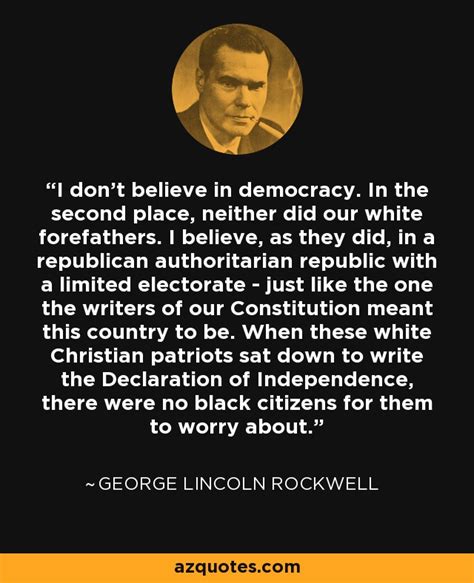
National Review could never have found a more consummate publisher than William Rusher, a prominent spokesman for the late-20th century’s conservative movement. As fountainhead of the New Right, he was the magazine’s direct link to influential conservative and Republican circles. Rusher was a lifelong conservative, hitting all the archetypal fusionist notes: ecstatically organizing support for the milky-hued Rhodesian ethnostate, campaigning for Goldwater and Reagan, proposing a conservative “new majority party” to bring together Democrats and Republicans still mad about segregation and societal progress to support of a Reagan-Wallace ticket in the 1970s, recurrent Pinochet fanboy, imagined barrages of “liberal bias” in every corner of present-day America’s society, anti-communism/anti-“modern liberalism” activist railing against every cultural aspect that fell outside of white Christianity, and was intimately involved in more than a few SPN-associated Republican/fusionist think tanks.
Being published in Buckley’s magazine gave boosts into the reactionary cool kids’ club for a herd of hard-Right provocateurs like Dinesh “professional Jonanist” D’souza, Dennis “faux-college dean of urine & feces” Prager, Ann “not a big fan of the 1st Am” Coultier, and Pat “inspirer of Proud Boys” Buchanan. But a parade of even more agonizing soi-disant far-right academics, whose dribble became the fertilizer for current crops of extreme-Rightists regurgitating threadbare racist conspiracy theories and “civil rights is communism is democracy” monologues, were also gifted lifts into the Bircher-shaped spotlight via the “preeminent journal of conservative opinion.”
A quick jaunt through the recognizable contributors list finds holocaust denier Joseph Sobran, pseudo-academic racist Taki Theodoracopulos (whose magazine Gavin McInness kicked off his “Proud Boys” under alt-Right puppet Richard Spencer's editorship), racialist/eugenicists Charles “Bell Curve” Murray (American Enterprise Institute & modern eugenicist guru) and Victor Hanson (Hillsdale) and Richard “Mankind Quarterly” Lynn (publishing partner of Roger Pearson), various ferociously fascist-fanboys and über-antisemites like Ezra Pound and of course Revilo Oliver, VDARE's Peter Brimelow (whose über-racist articles shaped Trump's immigration policies via Stephen Miller) and Sam Francis (American Renaissance, Council of Conservative Citizens) and John Derbyshire (Taki's), alt-Right panjandrums Jared Taylor (AmRen and Council of Conservative Citizens) and Paul Gottfried (Mises Institute, coined “alt-Right” with Spencer while at Taki's), influential anti-immigration “expert” and VDARE promoter Mark Krikorian, fascism and dictators-fanboy Rod Dreher, League of the South founder and apartheid/Rhodesia-fan Thomas Fleming, as well the older guard who came up with “fusionism” as an academic term for what is commonly referred to as “the Libertarian™-to-Fascist pipeline”, such as Murray Rothbard (alt-Right guru who founded the Cato Institute with the Kochs and championed David Duke) and Frank “fusionism” Meyer (inspirer of groups like the Heritage Foundation).
Many of these personalities have also spent time working intimately with the Heritage Foundation. Speaking of, over the last decade or so, readers may have came across TownHall.com “articles” and wondered what this uptight American complain-a-thon was and why so many of Buckley’s goofballs show up in it. That would be “synergy.” TownHall is a “media” machine that started as a BBS online forum created in a National Review and Heritage Foundation joint venture. It quickly became the “largest conservative site on the Web,” now residing in the rapacious hands of the Salem Media Group as another appendage of the extra-conservative media empire’s expansive reach. *(Speaking of Salem produced programming partners, TPUSA's Charlie Kirk also has his own “We are a republic, not a democracy” routine. Another spectacular example of either intentionally disingenuously misdefining terms for rhetorical effect OR someone who dropped out of community college before taking a single civics course yet speaking with the confidence of a mediocre white man.)*
Point being, NR is an in-print example of applying highbrow makeup on an ideology so “traditional” that it cannot shake old financial and ideological ties to its reactionary past. Its founder rarely, if ever, shied away from justifying and supporting some of the most wrong sides of recent history and the journal he birthed continues to carry on the tradition. The rhetoric is still mask-off with barely rehashed “average citizens shouldn’t be involved in choosing their fates.” Old segregationist & Bircher reruns. Not too long ago, a Welch-echoing article written by Lisa Shiffren from TownHall.com and the Independent Women’s Forum (another SPN club) pulled the old “interracial marriage & civil rights are just the start of a Negro Soviet Union” when riffing about the 43rd U.S. President’s past:
“How had these two come together at a time when it was neither natural nor easy for such relationships to flourish? Always through politics. No, not the young Republicans. Usually the Communist Youth League. Or maybe a different arm of the CPUSA. But, for a white woman to marry a black man in 1958, or 60, there was almost inevitably a connection to explicit Communist politics.
...
“Political correctness was invented precisely to prevent the mainstream liberal media from pursuing the questions which might arise about how Senator Obama’s mother, from Kansas, came to marry an African graduate student.
...
“It was, of course, an explicit tactic of the Communist party to stir up discontent among American blacks, with an eye toward using them as the leading edge of the revolution.”
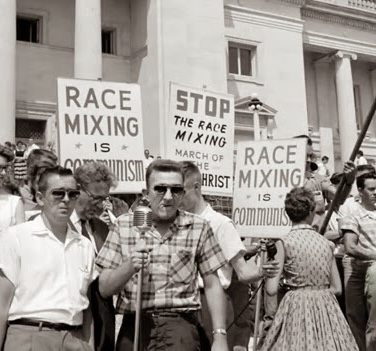
Americans weren't dumb. They called it out...
We are not saying that someone going out of their way to argue “We are a Republic, Not a Democracy” is a dead giveaway for segregationists or antisemitic conspiracy theorists. But it has been downright rare to hear this pseudo-axiom from anywhere but white-griping Right-wing circles.
Nevertheless, after all this exhuming of RNAD’s voyage through history, we are still left wondering if we are just perceiving these correlations from our modern vantage point?
Maybe we are simply projecting present-day biases onto the past?
So far & for the most part, the answer seems to be a pretty solid “nope.” Apparently, it is not just us. Americans in the past were not naive automatons who simply swallowed disingenuous and malignant reactionary tropes. Most saw the moldy chestnut for what it was. Seeing how some of the worst people were the ones who kept it rolling certainly cast a dark shadow on those 7-words. People noticed that its usage rose alongside increasing fascism. Fortunately those chanting RNAD were called out for what it was. Maybe we could all take some notes from our nation’s past and get back to not being so concerned about how offended authoritarian-minded jerks may get when we break it to them that the porous double-speak and fading gaslights is not actually hiding their dipshittery very well.
During World War II, the FBI noted how keen wannabe-Nazi propagandists were to repeatedly insert “We are a republic, not a democracy into their messaging. Many mentions of pro-fascist operatives and activists decreeing the tagline were recorded throughout the 1940s.
Undercover reporter Arthur Derounian's 1943 book Under Cover: My Four Years in the Nazi Underworld of America details his conversations and interactions with prominent members of the America First movements and their unabating “splitting of hairs” over definitions in order to undermine democracy and promote fascism with the ol' RNAD. In 1946, Derounian followed up with The Plotters, pointing out the same usage of RNAD by nationalists reducing democracy down to a Jewish plot to turn the nation into some Communist hellhole.
Following World War II, Congressmen stressed how messed up it was that RNAD was still being utilized to disguise pro-fascist proclivities…
Antidemocracy is another of the great common denominators of the Fascist-minded, “Democracy is decadent,” Fascists everywhere declare. In the United States, the favorite theme among the pro-Fascists is that our country is a “Republic,” not a “democracy.” Democracy, the “anti’s” say, is “mobocracy,” the rule of the mob. A “Republic” is the rule of the elite, while democracy, according to their definition, is a synonym for communism
As well, discussions were had in Congress concerning propagandists like Upton Close & Merwin Hart’s use of RNAD to only faintly shroud their fascist ideals.
Prolific researcher and political scientist Claudius Johnson addressed the room-dwelling elephant in his 1947 book Government in the United States:
“Those who insist that the United States is just and only a republic never tell us exactly what they have in mind.”
Johnson explains that the “modern democracy” they claimed to oppose were the initiatives and referendums, antitrust & anti-lobbying laws, popular elections for offices, and any regulations, pensions, welfare, or societal progressive laws created by freely elected officials. His astute observations had been already proven in the words & actions of anti-New Deal America Firsters before the book’s publication. The Birchers and their ilk, who came trailing after, then went gone out of their way to prove Johnson wholly correct.
In the 1950s, the persistent use of RNAD by segregationists to attack public education (this should sound quite familiar) was easily identified:
“Certain very reactionary extremist groups in this country are waging an all-out propaganda war. . . against what they term welfare statism, collectivism, socialism and Marxism...
“In their desire to preserve their version of the American way of life they include educators in their list of “left-wing” organizations. Their list includes groups and individuals who are fighting for democratic principles—fair treatment to minorities, better understanding between religious and racial groups, advancement of civil rights and civil liberties. The word 'democracy' seems to be offensive to them. They declare that this country is a republic, not a democracy.”
Especially with the Birchers and their membership of apartheid-apologists & neo-fascists revamping RNAD into a theme-song, those who noticed did not hesitate to quickly make fun of the chicanery…

With battles for civil rights and integration tumbling into the 1960s, purveyors of backlash willingly brought the spotlight upon themselves and their calls for curtailing the American experiment. In the saner media, op-eds drew attention to the far-Right’s continued use of their myopic anti-democratic precept. Small town newspapers covered the JBS’s baffoonish attempts to expand their Libertarian™-segregationist rabble by passing themselves off as local “Study Groups.”
Articles hit the same points Jefferson nailed 150 years earlier when he noted that, except a handful of eccentric diehards persistently cobbling together poorly constructed straw-men, literally nobody was even talking about direct democracy…
Every time, it came from some extreme right-wing individual or organization, which used the slogan to cover its reactionary purposes.
“ Always these purposes were to turn back the clock and wipe out social and economic gains the common people, by democratic methods, have made through their government and their labor unions. That's why right-wingers spread propaganda saying the forefathers who wrote the Constitution never intended to set up a democracy.
...
“'The government of a republic is known as an aristocracy or oligarchy if power is held by a small group ... or a dictatorship if power resides in a single person. When, however, control rest with a majority of the people who have the opportunity to express their will freely in their choice of public officials, the government is a democracy.'
“What the Birchers and their kind seem to have in mind when they shout 'republic, not democracy,' is to take power from the people and put it in the hands of an elite. We don't believe the American people will fall for that kind of a scheme.”
Constitutional Democracies
Yet another recent addition to the roster of anti-democratic presses from expected corners is the new fangled “Convention of States” scheme to ecstatically rewrite the U.S. Constitution. Sadly, we are not talking a few more tweaks for some distinct conservative advantages. This is the unabashed collaboration of white Christian-conservative activists and politicians with well-resourced Rightist organizations cultivated alongside the SNP-affiliated Tea Party movement for the first time in history calling for a constitutional convention under Article V in order to overhaul the Constitution. The plan is an extremer spin on Calhoun's doctrine of nullification promoted by many of the groups this write up has grown to love. Like impetuous clockwork, the Heritage Foundation mechanistically label this plan a “grassroots effort,” despite it being another cash-rich project endowed by Mercer and Koch balance sheet entries over at the American Legislative Exchange Council. As if the Heritage Foundation and Turning Point USA’s “Project 2025” were not a gross enough proposal completely remaking America into a theocratic autocracy, this Convention of State’s plan would directly write out American democracy to replace it with a version of “Republic In Name Only” that would not bode well for any one but maybe a privileged few Rightist swamp-toddlers in Washington DC.
Which could be why even the John Birch Society (who is still very much around) is like, “whoa, that's too over-the-top for even our brand of screwballery”. Granted, Birchers dig these nouveau-conventioneers’ “government should be so small it could drown in a bathtub” shtick, but they would rather utilize Article VI to shrink government instead of blatantly imploding the Constitution to refashion it in such an overtly monocratic manner. Although it has caused quite the fun rift in conservative “constitutionalist” circles, all the (literal) big money is on bringing court cases and getting the remaining states (19 have passed legislation and 9 have bills in legislation) to sign on and reach the required 34-state goal to enact a new constitutional convention with an extremely white and conservative theme.
Because they have mostly been relegated to more shawdowery corners, this has probably been the JBS’s most news coverage in decades. But the influence of groups like them and their progeny keeps coming. One could argue that it has become more ubiquitous, because the groups they inspired are seeing the fruits of their slow methodical decades-long labor finally coming to fruition…
Which again, bodes horrible for almost every last one of us.

But if we really want to talk about constitutionalism (this is as good a place as any to drop this blurb), without democratically choosing representatives or voting on ballots, the supposed sacrosanct “We the People” would just be three diminutive words written in large font on a sheet of paper under Philadelphian glass to make our little patriotic hearts forget about the whopping amount of Americans that have been historically disenfranchised in the past.
However, the words of the U.S. Constitution guarantees comparatively fewer rights than much of the rest of the world’s constitutions and has less than half (26 of 60) of the provisions that the world’s average bill of rights contains. Which may explain why designers of other constitutions since 1787 have used America’s as an example to be less emulated, but rather more as lesson in what not to write in order to avoid the flaws and mistakes in their own constitutionalism. (especially given that the U.S.'s was written in a time of horse, buggies, and extreme racism & inequality) Chickens from eggs laid 235 years ago appear to be coming home to roost in a coop of electoral results denial, institutionalization of minocracy, and the derailing of virtuous checks and balances.
But none of that means America has not been learning, trying, and using its amendment process to expand suffrage and democracy to its people. The 9th and 10th Amendments both discuss the rights and powers of those humans which the first 7 words of the Preamble directly refers to. Furthermore, the 14th, 15th, 17th, 19th, 24th, and 26th Amendments address voting rights, allowing us to democratically elect our representatives. And as mentioned earlier, several of the Constitution’s co-creators, as well as a most progressive and conservative presidents, have been on record describing the U.S. of A as a “democracy” and/or “representative democracy.” It seems to make much more sense to go with authentic historical voices, as opposed to the “We Are A Just a Republic” rabble with a fashy pedigree.
Maybe this is why a Constitution-demolishing “Convention of States” looks more like the result of underfunded school systems or maybe rampant homeschooling by historical-revisionists adults who grew up to be mad that they were unable to inherit a country as racially homogeneous and evangelically supremacist as the one their mediocre ancestors enjoyed.
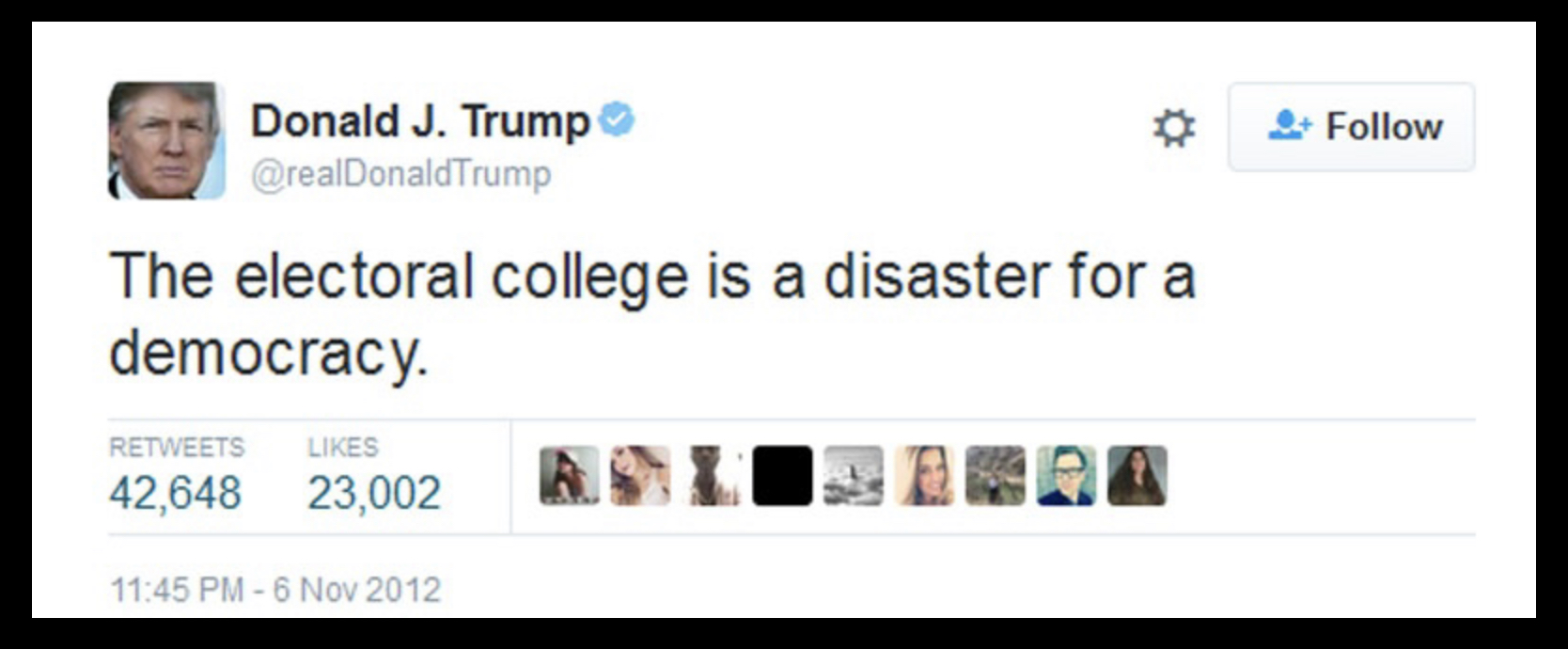
To be fair, the U.S. is not doing the democracy thing well
We should acknowledge that “we are not a democracy” is not an entirely incorrect observation. The U.S. cannot seem to solidly codify voting rights for its citizens. Gerrymandering is still a pervasive problem. A non-partisan electoral agency to maintain fair, safe, and legit elections is not even being considered for the American system. Nor is there much gumption to replace an antiquated independent-party-crushing First Past the Post and a slavery-era amendment-generated Electoral College with something considerably more democratic, like Ranked Choice/Instant Runoff or Proportional Representation. Lower & middle classes, women, minority & people of color, LGBTQ, handicapped, struggling farmers & independent gig-workers, and other substantial swathes of Americans remain underrepresented in outmoded corridors of power of local, state, and federal governments.
Conversely, the parliamentary halls, executive offices, and judicial benches continue to be crammed with an excess of electable but inept frantic-bible/flag-wavers that money can get past that post first. But that is beyond this article’s scope, so we will leave that for others to address who are much better at it than we ever could be.
 As we have now seen, “We’re a Republic, Not a Democracy” is a well-worn disingenuous axiom that will likely not see retirement any time soon. Right-y free-market elitists and segregationist chuds opposing equal representation have fallen back on it without cluing us in on what they actually mean by this “republic.” Current Louisiana congressman & SPN mascot Mike Johnson’s “we don’t live in a democracy” but a “biblical” republic comes to mind. Heck, conservatives have been complaining about people voting on existential issues since before Kansas chose not to become a slave state. So besides the optics of “a republic if we can keep it” having been tainted by a parade of pale prejudiced dweebs, what even do they mean by “republic?”
As we have now seen, “We’re a Republic, Not a Democracy” is a well-worn disingenuous axiom that will likely not see retirement any time soon. Right-y free-market elitists and segregationist chuds opposing equal representation have fallen back on it without cluing us in on what they actually mean by this “republic.” Current Louisiana congressman & SPN mascot Mike Johnson’s “we don’t live in a democracy” but a “biblical” republic comes to mind. Heck, conservatives have been complaining about people voting on existential issues since before Kansas chose not to become a slave state. So besides the optics of “a republic if we can keep it” having been tainted by a parade of pale prejudiced dweebs, what even do they mean by “republic?”
Sometimes the response is an equivocal “a constitutional republic,” which clears up almost nothing. A constitution is not what makes a republic. But at this point, almost every republic is constitutional (and most of those are considered democracies). Switzerland, often touted as the closest case of quasi-direct democracy, is also a constitutional republic. Anecdotally, if we do not get too wrapped up in the figurehead part, nations like the U.K. and Canada are informally labelled a “crowned republic” or “monarchical republic” because, as John Adams pointed out, they operate essentially like any other republic. Furthermore, since they very much are formalized under constitutions, they would also be considered a “constitutional republic.”
As well, China, Russia, Cuba, and the former USSR are all “constitutional republics.” But there are some crucial democratic components missing, which sets them apart from other republics like the United States. Considering the genre of Americans discussed so far, adamant about the U.S. not being a democracy, we are starting to think that these kinds of one-party oligarchies may be the muses for the style of polity that the anti-democratic/pro-republic reactionaries are striving for.
On the other hand, annoyingly pedantic RNAD-obsessed Right-wingers seem to quite enjoy prattling on about what they think “democracy” is and all the problems they can come up with to pin on it. Apparently it can only be defined as synonymous with unadulterated pedal-to-the-floor pure uncut “direct democracy.” Quite the straw-man to construct when pretty much no one is or was proposing any such notion. Continuing to equate it to socialism and communism is even more bonkers on so many levels when rarely are these economic systems even on anyone’s radar when discussing the ideals of the nearly universally revered “democracy.” Seems we should do some investigating into how much the underfunded American education system has cut its Civics and History courses.
Maybe in a less brain-wormed world, Americans could come to use the objectively accurate and more concise “We aren’t a Direct Democracy, We are a Democratic Republic” to aid in the prevention of superfluous ambiguity.
Speaking of clarity, Charles Beard, the history professor who returned crackpot attentions to RNAD with his 1913 book, subsequently discussed similar concepts and definitions thirty years later in his aptly named The Republic: Conversations on Fundamentals. In fictitious conversations with others he discusses the history of the word “democracy” being bastardized by English aristocrats to signify any “government by the rabble” and its later use in the American colonies by Whigs and rich landowners to smear laborers, agrarians, and slaves who they feared would stop working and seize their properties. Eventually, average Americans adopted the name “democrat” for themselves and their Democratic-Republican Party until eventually settling on “Democratic Party,” which the Republican Party subsequently emerged from.
Beard explains that although there is no mention of the term “democracy” in the Constitution, there is also no law or mention of the U.S. being a “republic” either. Yes, according to a single line in Article IV, each state is guaranteed protection and a “republican form of government,” but nowhere is the federal government branded a “republic.”
Plenty of republicanism is written into the federal constitution. There are also large hauls of democracy packed in there as well. Since the 1790s, it has been amended to include increasingly more democratic principles which give us many of the freedoms and rights that we take for granted today.
Beard’s book is a decent read on this subject, as well a peek into how 1940s Americans thought about these terms. He wrote a decent summary of how democracy is characterized nowadays...
1. People, not a legalized monarch or class, are the source of all political power. “The voters directly choose the principal agents of government and, through their agents, indirectly, all other persons who have political power over life and property.”
2. “Through agents chosen by the voters, all laws are made.”
3. The chief agents of government must retire at fixed intervals or submit themselves to another vote if they seek continuance in power.
4. “All voters are equal; without regard to intellectual, moral, or economic qualifications, has one vote and no more; and in elections, as a rule, the candidate who receives the highest number of votes, whether a majority or a plurality, is placed in office.”
Proceeding further with some of the concepts we have came across while researching for this article, democracy, “rule by the people,” has become a bit of a catch-all. Modern features of typical democracy frequently includes competitive elections, freedom of expression, and protection of individual civil liberties & human rights.
Moreover, most republics are inherently democratic. As anyone who has taken an AmGov class knows, democracy is an essential element of most modern republican systems. Proper democracies require discussion and compromise to flourish — something that can also be applied to damn near any organization, even a household or the inner workings of companies — as well as a defined system of government relying on representation.
When world leaders speak of “democracy,” these are the kinds of ideals that they refer to.
When U.S. military and politicians talk about “spreading democracy,” for better or worse, this is what the PR campaigns are selling.
We never hear of “spreading republicanism.” Partly because it sounds rather goofy when said out loud. And again, most sane humans who have ever lived long enough to ponder governance have viewed the two terms as rather synonymous. We say “exercising our democratic rights.” But no one says “exercising my republican rights.” On the flip-side, calling the U.S. “the Republic” sounds appropriate, but calling America “the Democracy” sounds weird. If the Pledge of Allegiance contained “and to the Democracy for which it stands,” it would be clunky as heck. (“but it’s in the flag pledge” is a favorite argument for RNAD. Also a bit ironic given the author of the oath was a socialist, an adherent of an economic system maligned as derived from cursed “democrats.”) It fundamentally comes down to how language is used. The modern definitions are so damn close that arguing in the First World about “republic” being confusingly antithetical to “democracy” is facepalmingly inane at best.
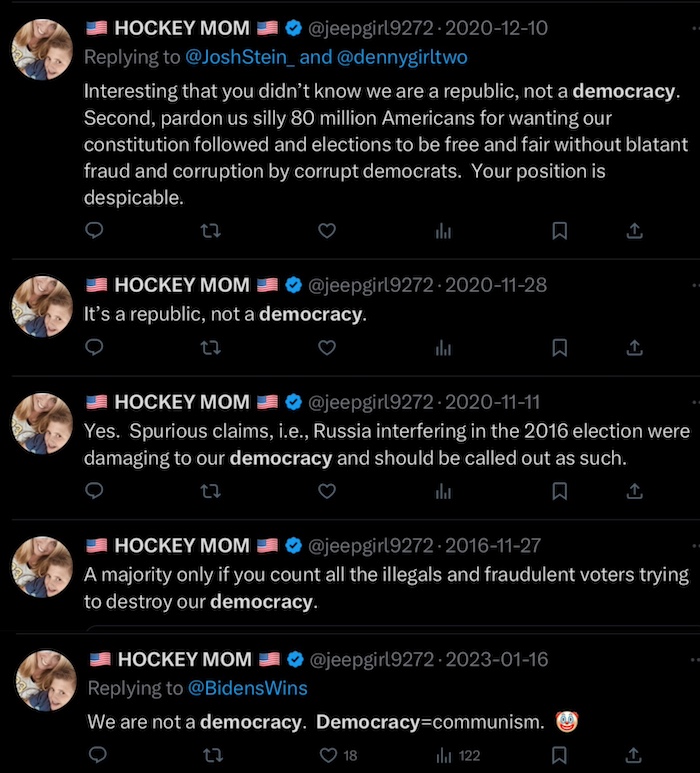
Even more hilarious is the amount of think tanks, Religious-Right activist groups, Libertarian™ syndicates, and various online nut jobs with long histories of RNAD-inspired promotional literature and unhinged social media posts, also having plenty to say about the awesomeness of American democracy, what an essential gift it was that the Founders bestowed democracy upon us, how protecting & engaging with democracy is integral to our modern society, how democracy (even the direct kind) is an indispensable element of modern republics, and with all their innate downfalls, republics may actually be a bit overrated. The cherry on top is seeing this kind of discourse in print or on websites only a few pages/posts away from another contributor ranting about how the U.S. is in no way whatsoever a democratic democracy.
On a similar note, how is it that Libertarians are some of the loudest about the country being a republic when their whole thing is “no one else is above me except whatever money and market forces may come?” Or is it all just a put on and they have given up denying that their aforementioned pipeline to fash-land exists? We have yet to come across any believable rationalization, but it is rather fun that it only took National Review’s Bill Rusher, principal originator of modern conservatism and architect of the interconnectivity between laissez-faire capitalist and traditionalists, one sentence to succinctly explain democracy as a “free-marketplace of ideas” in terms one would think they could understand. It is better than anything we could come up with:
 .
.
Despite the “let the market decide” mantras, free-marketeers do really seem to prefer and rely on governments to prop up their markets and businesses and even their political ideologies. Is “Faux-Laissez-Faire” a word? Because “libertarian,” given that the anti-authoritarian political philosophy the word denoted until Rothbard celebrated ripping it off in the ’70s, really does not seem to fit those guys. And representative democracy is not necessarily immune, but republicanism has historically had an oligarchical bent.
Besides all that silliness, no reasonable definition of democracy would exclude the United States of America. Elsewhere across the globe, where 95% of the (non-American) humans live, at least 159 nations use “Republic” in their official names. If one is really fixated on an American Exceptionalism fetish, then dying on an “We Are Only a Republic” hill is an embarrassingly silly way to do one’s performative red-white-bluery.

“Republic” is a Word, Not a Hill to Die On
s lengthy as it is, this 4-part article has been nothing more than a speedy recounting of “We Are a Republic, Not a Democracy” through the annals of American history. We leave it to the oodles of others with actual academic clout to explain the perplexities of political theories, distinct differences in speech or thought between now and bygone days, semanticist concepts & confusions, and what actually entails a nation being “Not A Democracy” in our modern era. (a heap of links have been provided below for the reader's perusal)
But please allow us to end with a few brief impressions born from months of researching the history behind RNAD…
For the pedants still hung up on interpretations of the colonial era’s interpretations and usage of ancient civilizations’ interpretations of what words may mean, maybe take a few moments to consider the type of self-defining fascists and segregationists who made “We are But a Republic” their mantra. While you are it, maybe update your vocabulary to 2024 terminology. That or get used to the eye-rolls and being waved off as yet another in a long line of unserious dorks. Super cool life choices.
For the rest of us, although the “immigrants/minorites/woke/globalist-socialist-corporate-bankers are coming for our fragile white kids to turn them into a mobocracy of transgender communists” sounds like played-out baloney to the general population, reactionary rage-farming can still raise a bountiful crop of votes and financial support from those who have internalized a zero-sum game of anything approaching equality for others feels like oppression to those already possessing privilege. There are multiple levels of unfortunate irony built into such a self-knee-capping strategy for politicians.
For one, moral panicking does nothing to help a society move forward into the future. Nor does it make things better for anyone, especially the Americans who have gobbled up manufactroversies constructed by well-off online/cable/radio rage-vendors. These people persistently search for an enemy, usually a foe conjured up who was not on their radar just a few moons earlier, who has zero affect on Americans’ day-to-day life whatsoever. Making “democracy” the nemesis, for fear of the “wrong people” being granted a choice in how their lives are governed, is equally as wackadoodles. Adding to this, broadsides against “others” having choices somehow making conservative white men “victims” illuminates the projection of the kinds of choices these “martyrs” would themselves make in order to “own the libs/left/immigrants.” Such revealing rhetoric is well into the realm of Accusation in the Mirror and even more disingenuous than proclaiming that “democracy” cryptically means “a pure democracy that is actually just communism.”
Secondly, what the heck is up with portraying principles like democracy and equality as products of some mysterious elitist cabal taking over the land for Communism/Beelzebub/Sharia/Depopulation/Rainbow Flags? Very bizarre because it is insane to believe that citizens having the same opportunities to live and have a say in how they are to be governed is somehow a more tyrannical predicament than a nation ruled by a handful homogeneous politicians handpicked by a small band of like-minded men who already hold outsized amount of wealth and power. Which is literally the definition of “elitist” (belief that some things should be controlled or owned only by the richest or best educated people). Politically speaking, “plutocracy” or “oligarchy” would be relevant terms and be perfectly compatible with a “republic.” And like wealthy secessionists and segregationists of the past, those cranking the “republic, but not a democracy” crusade up the loudest have chiefly been well-to-do oil, auto, and publishing magnates who have been very candid about how they, “the captains of industry,” should be the given all the strings to manipulate government with, rather than just a bulk of the strings already purchased long ago.
There is some irony in making use of democratic processes to obtain enough power to curtail democracy. At least for the time being, they still technically need consistent electoral wins in order to keep creating their variants of legislation, place allied magistrates on court benches, and fill normally nonpolitical governmental positions with political appointments. Is this the “republic” they want? As we have pointed out that for centuries, those with privilege and power have been upfront about their fear of democracy. They are probably not wrong that there would be less billionaires if we were more democratic. But we would also be more likely to have a more equitable society as we see in other nations that tend to be better at doing democracy. In spite of a “mobocracy” that never arrives in these democratic lands, the sturm und drang in a society of diminishing citizens’ rights, liberties, and safety under a strict republic sure sounds like a dismally despotic fate for everyone but the few elitists sitting atop the heap. Little surprise that we found most of this “We are a Republic, Not a Democracy” in promotional material of fascists and segregationists declaring that a republic was the only veritable bulwark against a “tyranny of the majority,” circulated at the exact same time Jim Crow was busy curtailing the citizenship rights of minorities.
They may view and demonize democracy as a threat to their standing and privilege, but they still need democracy’s assistance to reach their minocratic objectives. Because for now, this is how the sacrosanct U.S. Constitution and the nation’s political norms currently work….
…until they no longer do and this “Republic” becomes Jefferson’s 173 elitist despots of lily-white Christian Reconstructionism. Or perhaps something markedly worse.
for the visual learners...
We spent entirely too much time putting together a visualization to display the interconnectedness of the “We are just a Republic” promulgating creatures and their buddies discussed here.
We realize that some readers may get hairs up over a few associations. Most of these characters are legendary for their ceaseless Red-baiting, Jew-baiting, and Woke-baiting. Many built their “organized discontent” brands and well-funded partisan organs focused on the othering of their fellow Americans. So as far as we are concerned, they lopped off any of those “nuh-uh” legs they could have possibly stood on quite some time ago. Besides, if there was enough corroboration for a link, we made it. And although crazy long, this 4-part article is much too short to cover every detail.
Honestly, making this chart was more a labor of love, so we will surely be building on our beanplating in future articles elaborating on these kinds of shady connections.
(if you are having trouble seeing the interactive network-graph, try THIS)
Okay, one last thing, we promise...
Humongous thanks to Ernie Lazar over at the Internet Archive. We don't know who Ernie is, but damn was his FOIA Collection an amazing archive of connections and answers. We dug through all sorts of online resources, but at least 75% of the relatively authentic source material was already on the Internet Archive and its Wayback Machine. If you are able, please toss them a donation to keep freely accessible records up and running the way the world wide web was intended to be. That would also give a big middle finger to many of the dingleberries we have been talking about.
Oh, and this whole thing was originally published over on Medium as well.
#Democracy #weAreARepublicNotADemocracy #Republic #AmericanHistory #altRight #Libertarian #HeritageFoundation
...
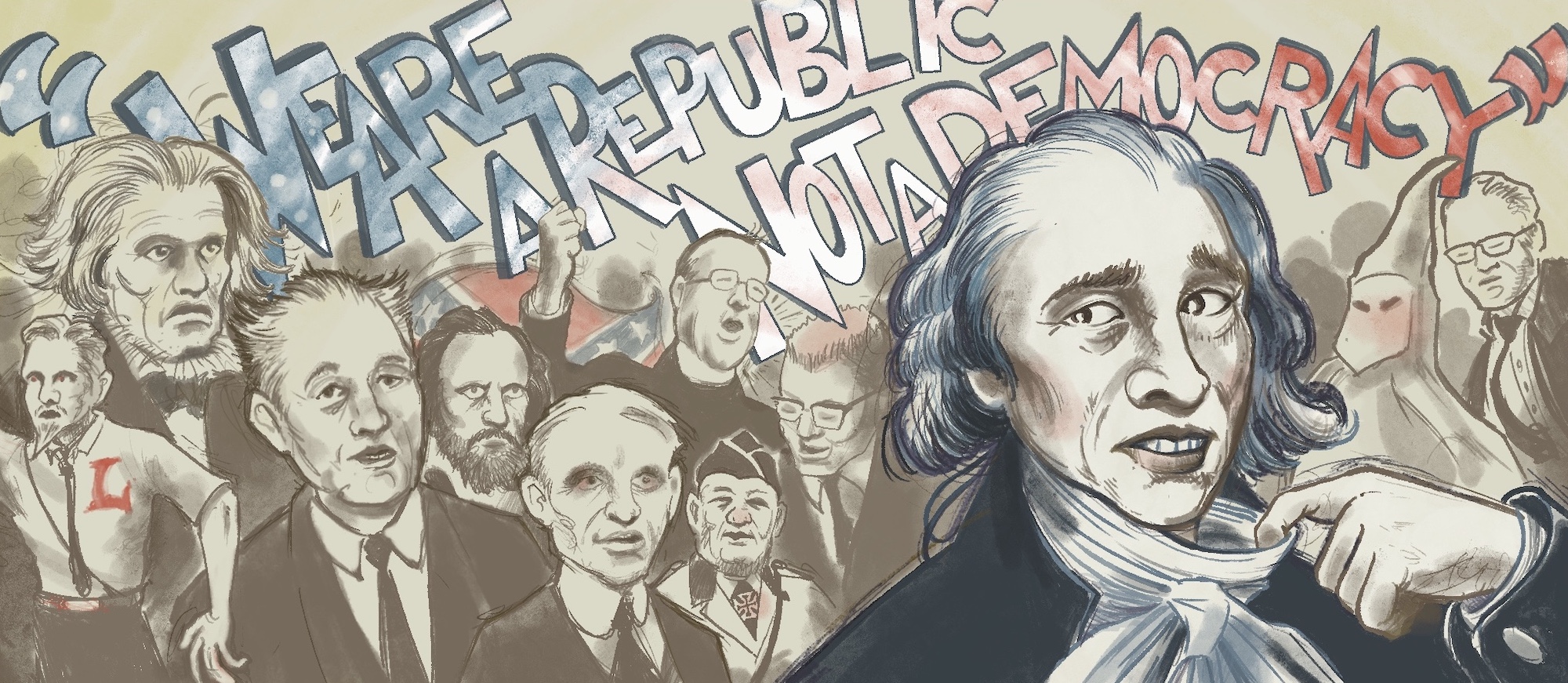
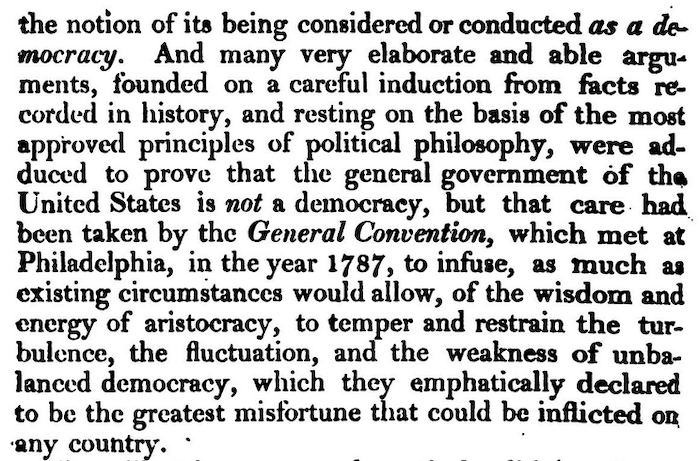
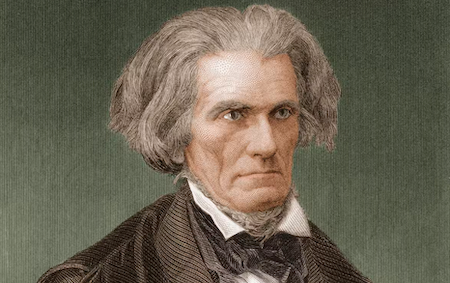
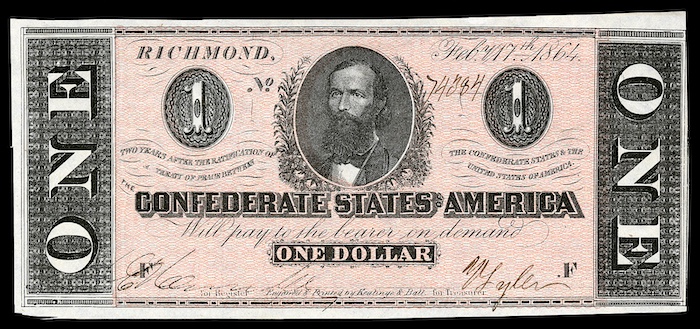


 Speaking of, RNAD has also been a recurring theme of countless National Review articles. “Countless” because a quick
Speaking of, RNAD has also been a recurring theme of countless National Review articles. “Countless” because a quick 




 As we have now seen, “We’re a Republic, Not a Democracy” is a well-worn disingenuous axiom that will likely not see retirement any time soon. Right-y free-market elitists and segregationist chuds opposing equal representation have fallen back on it without cluing us in on what they actually mean by this “republic.” Current Louisiana congressman & SPN mascot Mike Johnson’s “we don’t live in a democracy” but a
As we have now seen, “We’re a Republic, Not a Democracy” is a well-worn disingenuous axiom that will likely not see retirement any time soon. Right-y free-market elitists and segregationist chuds opposing equal representation have fallen back on it without cluing us in on what they actually mean by this “republic.” Current Louisiana congressman & SPN mascot Mike Johnson’s “we don’t live in a democracy” but a 

